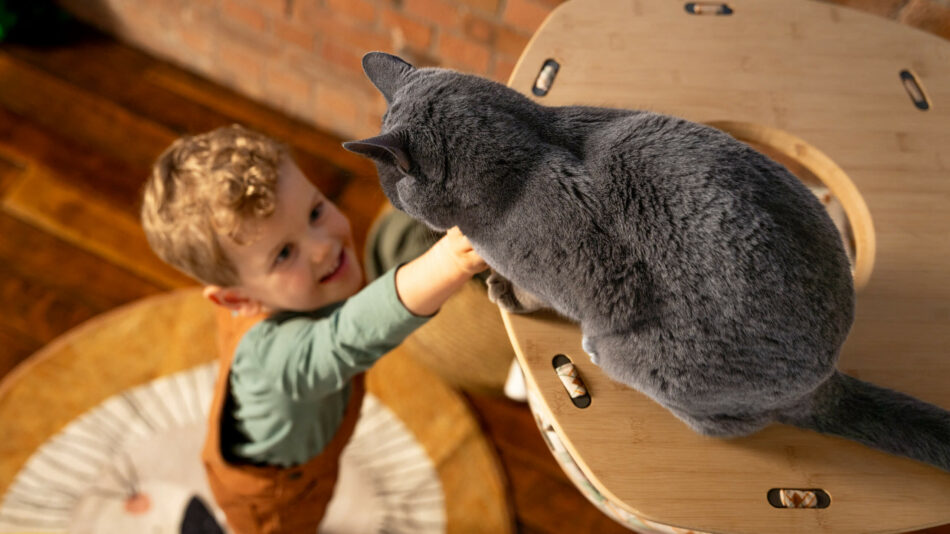10 things humans do that cats hate
It’s no secret that cats are opinionated, and there are 10 things humans do that cats hate. These feelings aren’t wielded as a personal vendetta against their owners — they’re just natural behaviours domesticated felines have inherited from their wild ancestors. So before you chalk up your cat’s attitude to quirky personality traits, see if some of your behaviours might be creating friction in your relationship with your feline.
Why are you the way you are? — Sincerely, Every Cat Owner
If you share your home with a feline, at some point you will inevitably ask why your cat does certain things. All cats are quirky — it’s part of why we love them. But a large reason for their unique behaviours is due to their close connection with their ancestry. You’ll notice cats still closely resemble cougars, lions, ocelots, bobcats, and other wild felines, while most dog breeds don’t share very many similarities in their appearance with wolves or coyotes. This is also why cats tend to be more aloof than dogs, and are more independent than canines.
Does this mean cats make bad pets? On the contrary — these attributes make cats loyal, loving companions once they’ve bonded with their owners. Connections between cats and humans run deep, spanning thousands of years. But to establish a lasting bond with your cat, you’ll need to understand their basic nature and avoid certain actions or behaviours that are off-putting to them. And while there are exceptions to every rule, here are 10 common ways humans interact with their cats that are actually offensive to felines.
Making loud noises around your cat
Cats have much better hearing than humans. This is a trait passed down from their wild cousins, and it serves them well in most circumstances. But their keen hearing also means that sudden or sustained loud noises can startle or grate on your cat’s nerves. Washing machines, loud conversations, blaring music, fireworks, parties, and yelling are all sounds that can stress your cat. Most cats will find a quiet place to wait out the commotion, so if you notice your cat hiding more than usual, take stock of the noise level in your home.
Aggressive petting
While dogs are known to enjoy an enthusiastic back scratch or belly rub, most cats prefer a more gentle approach. Heavy-handed patting, rapid scratching, or handling a cat’s tail, paws, or stomach will make some cats feel threatened. This can trigger cats to run, lash out with a well-aimed swat, or nip. Most cats also dislike being cuddled or hugged, which can also trigger similar stress reactions. Stick with gentle strokes to your cat’s fur, always going with the direction of their hair. Most cats will also welcome a gentle scratch under their chin or along the sides of their face.
Ignoring your cat
Not all cats crave attention — but when they do, it’s on their terms and in a manner of their choosing. Ignoring your cat when they’re demanding your attention can be a personal affront to them. If you notice your cat jumping into your lap, hovering around your hands, meowing at you, or laying across your work surfaces, they’re expecting attention. Many cat owners are no stranger to the phenomenon of having a demanding cat as a semi-permanent feature on their desk, keyboard, or lap, and it’s best to soak in the quality time while it’s their idea.
Bathing your cat
You may see tigers at the zoo play in water elements, but as a general rule, cats do not like water. In fact, they go to great lengths to avoid getting wet. A cat’s tongue is well-designed for keeping their coats clean, and the vast majority of cats won’t require an actual bath in their lifetime. So, resist the temptation to lather up your feline unless they’ve gotten into something too dangerous or sticky for them to clean off themselves.
Taking your cat for a car ride
Most cats do not enjoy riding in the car. While your family dog may happily bound into the car, their tongue lolling out the side of their mouth through an open window — your cat has very different opinions of moving vehicles. Cats are prone to motion sickness, and the combination of movement, noise, and smells will stress them. Limit car rides with your cat to necessary trips like vet visits or moving to a new home.
Adding new pets to the family
Some cats enjoy the company of others, but generally speaking, cats will be just fine as the sole pet in a home. Cats are territorial, and are perfectly content having a house to themselves. Bringing a new pet home, whether it’s another cat, a dog, or even a small pet, can create stress for your feline. Always introduce new pets slowly, and watch your cat’s reaction closely. Some cats can cohabitate with others, while others will always prefer to be the sole apple of their owner’s eye.
Rearranging your home
Moving furniture around your home may be feng shui, but rather than having a calming effect on your cat, it can be quite the opposite. Cats are very in tune with their surroundings and even small changes can cause them to stress. This is especially true if you move their belongings to a different part of the house, or if you’re moving to a new home. Give your cat plenty of time to adjust to changes, no matter how small they may be.
Leaving the litter box dirty
Cats are very concerned with being clean. They are meticulous with their coats, prefer pristine surroundings, and despise a dirty litter box. Your cat will avoid using a litter box that’s too full or smelly, which is one of the main reasons for cats seeking alternative options in your home. The desire to cover their eliminations again stems from nature — they want to hide their presence from other animals. Clean your cat’s litter box daily, and don’t use scented litter or deodorisers, as these can be off-putting or too strong for your cat’s keen sense of smell.
Physical discipline
Negative reinforcement in the form of physical discipline doesn’t communicate to cats. Swatting your cat for unwanted behaviours is a sure way to break their trust and damage your relationship with them. By nature, cats are dominant, independent animals, which makes them reactive to physical discipline. If you see your cat doing something less than desirable, break their attention by clapping your hands, whistling, or speaking sternly to them. Redirect them to a desired behaviour, and reward them with a pet or a treat.
Not giving your cat enough space
A cat bed in a secluded corner or a cat tree with multiple levels of escape is what all cats crave. While most cats will happily cohabitate with their humans, they need their own space to retreat to throughout the day. Cats are solitary animals by nature, so they need a quiet refuge from human routines and activities. If you see your cat napping in their space, observe and appreciate them from a distance — they’ll come to you when they’re ready.
Omlet and your cat
Cats are intriguing and mysterious pets that grace the homes of millions worldwide. Their popularity is second only to dogs, speaking to their allure and delightful companionship. Our cat products speak to their nature, and encourage natural behaviors to help your cats live healthier, happier lives. From cat trees and scratchers to cat litter boxes and cat beds, we have everything your feline needs to feel their best.
This entry was posted in Cats


